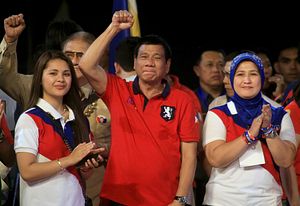With Rodrigo Duterte now officially confirmed as the winner of the Philippines’ presidential election last Monday, it is time for some brief thoughts on the immediate implications of his victory.
Duterte will now try to win a mass of defectors from the president’s party. Although the Liberal Party performed reasonably well in some local elections, political parties in the Philippines are notoriously weak, which is one reason why charismatic figures like Duterte and celebrities are able to win higher office. Expect the president-elect to try to win over large numbers of Liberal Party members who won local elections earlier in the week.
Duterte is not going to focus on foreign affairs; he might not be as accommodating to China as some suggest, but he is also not going to prioritize the conflict in the South China Sea—no matter what he said on the campaign trail about jet skiing to contested waters to reinforce Philippine claims. Like President Joko Widodo in Indonesia, Duterte has been elected with a mandate to focus on domestic issues, principally inequality, perceived needs for political reform, and crime. He has already promised to continue many of President Aquino III’s macroeconomic policies. He is a mayor, and he will likely stick to these domestic challenges. He is unlikely to just jettison Manila’s South China Sea arbitration case, as some Philippine and U.S. commentators have feared; the case is near completion, and the decision will probably be released this summer. Duterte surely realizes that if Manila wins, it will be a boon for the Philippines’ claims. Even if he ultimately wants to take a more accommodating stance—which would surely worry the United States and other partners—and work more closely with China in resolving South China Sea claims, winning the arbitration might provide some leverage.
Duterte is going to press hard for major reforms to the Philippine political system. The president-elect surely understands that the idea of changing to a parliamentary, more decentralized system is popular with most voters, and also might help entrench his rule in the long run. In addition, there are substantial, serious arguments to be made for switching to a parliamentary system or some kind of hybrid presidential/parliamentary system. Such a switch would potentially empower more regions of the country, foster wider development, reduce the influence of a small number of political elites, and eventually make for stronger and more ideologically coherent political parties. Getting there—reforming the constitution—will however be extraordinarily difficult. And while Duterte’s at it, he might consider changing the laws on the presidential election to mandate runoffs, French-style, so that the winner has to take at least the majority of the votes.
Leni Robredo makes an unlikely coup-plotter. Leni Robredo, who appears to be the next vice president, is a left-leaning social activist, lawyer, and politician. She is renowned for her advocacy for better governance. Although it is true that, in the Philippines, previous vice presidents have collaborated with the military and helped facilitate presidents’ downfalls, putting the vice president in office, Robredo is hardly close to military elites. She is also a member of the Liberal Party—where top leaders remember the many attempted coups against Aquino’s mother.
Joshua Kurlantzick is a fellow for Southeast Asia at the Council on Foreign Relations. This post appears courtesy of CFR.org.

































